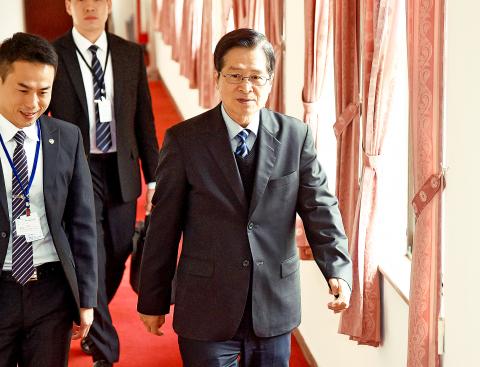The military has requested that Google limit the exposure of military installations in Google Maps’ new 3D function after netizens discovered that they could view missile defense batteries ringing Taipei, Minister of National Defense Yen De-fa (嚴德發) said yesterday.
The enhanced function, which went partially online three days ago, allows users to zoom in and view locations whose satellite imagery Google has digitized into 3D data.
Users can currently view much of Taipei and its surroundings through the function, including Taipei’s Shilin District (士林) and Sindian District (新店) in New Taipei City, where the National Security Bureau compound and missile defense batteries are located respectively.

Photo: Huang Yao-cheng, Taipei Times
The high-definition images clearly show individual MIM-104 Patriot missile launchers, as well as a detailed layout of the bureau’s headquarters, raising concerns that the Web-based tool could compromise national security.
Yen said that Google’s advanced commercial survey satellites and the open-source maps that they produce have been troubling military forces worldwide.
The military is changing its methods and procedures to meet such technological challenges, he said, adding that the Ministry of National Defense is confident that their effects on military operations could be neutralized.
“Important installations and bases have methods in place for force protection and preservation,” Yen said.
“A military camp’s peacetime posture does not indicate the positions forces will take when at war,” he said. “The public should not be concerned by this matter.”
The ministry is considering suggesting new legislation or regulations to shield military bases beyond the protections afforded by the Vital Area Regulations (要塞堡壘地帶法), the nation’s only law regulating the conduct of private entities around military facilities, Yen said.
The government has previously dealt with Google and other online map service providers over matters related to the display of sensitive installations on digital maps, a defense official said on condition of anonymity.
In each instance, the commercial entities cooperated with the government’s request to censor the sites, they said.
However, the military has placed a renewed emphasis on concealment and camouflage, as satellite technology, functionality and image resolution have advanced by leaps and bounds, they added.
“Mobile platforms, such as the Patriot Advanced Capability-3 and Tien Kung III missile systems, have over the past few years increasingly become the deployment method of choice, because fixed positions are more vulnerable to enemy fire,” the official said.
The US requires private Internet service providers to censor its military installations, as China does with Baidu Inc (百度), the official said, adding that the military takes force protection seriously and would take the necessary action to protect national security.
Additional reporting by Lo Tien-pin

CHAOS: Iranians took to the streets playing celebratory music after reports of Khamenei’s death on Saturday, while mourners also gathered in Tehran yesterday Iranian Supreme Leader Ayatollah Ali Khamenei was killed in a major attack on Iran launched by Israel and the US, throwing the future of the Islamic republic into doubt and raising the risk of regional instability. Iranian state television and the state-run IRNA news agency announced the 86-year-old’s death early yesterday. US President Donald Trump said it gave Iranians their “greatest chance” to “take back” their country. The announcements came after a joint US and Israeli aerial bombardment that targeted Iranian military and governmental sites. Trump said the “heavy and pinpoint bombing” would continue through the week or as long

TRUST: The KMT said it respected the US’ timing and considerations, and hoped it would continue to honor its commitments to helping Taiwan bolster its defenses and deterrence US President Donald Trump is delaying a multibillion-dollar arms sale to Taiwan to ensure his visit to Beijing is successful, a New York Times report said. The weapons sales package has stalled in the US Department of State, the report said, citing US officials it did not identify. The White House has told agencies not to push forward ahead of Trump’s meeting with Chinese President Xi Jinping (習近平), it said. The two last month held a phone call to discuss trade and geopolitical flashpoints ahead of the summit. Xi raised the Taiwan issue and urged the US to handle arms sales to

State-run CPC Corp, Taiwan (CPC, 台灣中油) yesterday said that it had confirmed on Saturday night with its liquefied natural gas (LNG) and crude oil suppliers that shipments are proceeding as scheduled and that domestic supplies remain unaffected. The CPC yesterday announced the gasoline and diesel prices will rise by NT$0.2 and NT$0.4 per liter, respectively, starting Monday, citing Middle East tensions and blizzards in the eastern United States. CPC also iterated it has been reducing the proportion of crude oil imports from the Middle East and diversifying its supply sources in the past few years in response to geopolitical risks, expanding

Pro-democracy media tycoon Jimmy Lai’s (黎智英) fraud conviction and prison sentence were yesterday overturned by a Hong Kong court, in a surprise legal decision that comes soon after Lai was jailed for 20 years on a separate national security charge. Judges Jeremy Poon (潘兆初), Anthea Pang (彭寶琴) and Derek Pang (彭偉昌) said in the judgement that they allowed the appeal from Lai, and another defendant in the case, to proceed, as a lower court judge had “erred.” “The Court of Appeal gave them leave to appeal against their conviction, allowed their appeals, quashed the convictions and set aside the sentences,” the judges